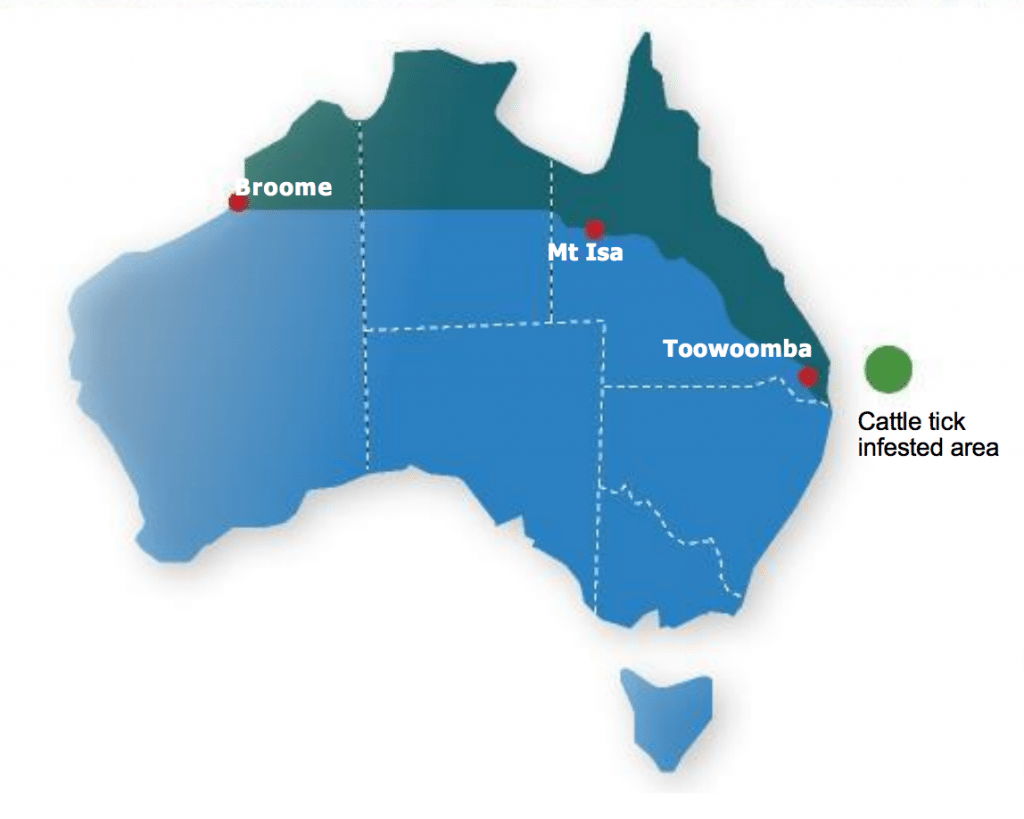The Queensland Department of Agriculture and Fisheries, Meat & Livestock Australia and QAAFI researchers have identified nine novel antigens for use against cattle ticks.
They are now calling for Expressions of Interest to become a licensee for development, registration and commercialisation of a tick vaccine.
Initial in-vivo results demonstrate potential use of the antigens in a vaccine to reduce the incidence
of cattle tick.
All nine lead antigens and some mixtures of them have been scientifically trialled in cattle at the Queensland
Animal Science Precinct (UQ, Gatton).
Previously, 50 to 87 percent protection was recorded using cocktails of antigens during early phase cattle immunisation trials in 2011. Efficacies of up to 61pc have been demonstrated using single vaccines, enabling the selection of antigens for a new vaccine product.
The antigens produce immune responses in cattle that interfere with tick attachment and feeding, reduce tick numbers and decrease the ability of surviving ticks to lay viable eggs.
The final trial is testing a selected mixture to determine if the efficacies are synergistic.
The Northern Australian cattle industry incurs losses of A$175 million each year due to the impact of ticks and tick-borne diseases, and through treatment costs to ensure compliance with regulatory protocols for interstate and international livestock movement.
Tick infestation can reduce beef and milk production, and (if severe enough) can cause death. However, the most obvious impact is caused by transmission of tick-borne diseases to cattle.
Current cattle tick infestation covers almost half of the northern Australian cattle-producing regions, with some regions having to dip cattle up to three times in a season.
Due to the high costs associated with losses to the cattle industry, the cattle industry and governments worldwide have identified the development of a tick vaccine with 12-month immunity duration and 90pc efficacy as a high priority.
An Australian provisional patent has been lodged and interested organisations will be asked to sign a confidentiality agreement.
Expression of Interest applications to become a licensee for development, registration and commercialisation of a tick vaccine from the identified antigens, particularly for the Australian cattle industry but also for overseas distribution, must address the following selection criteria:
- A demonstrated track record in developing and commercialising cattle vaccines or tick control products, with the current capability, commitment and resources to commercialise vaccines in Australia.
- The capability to commercialise, distribute, promote and provide support to deliver a quality vaccine and seek strong adoption in Australia.
- An understanding of the development, cost and commercialisation pathway for a cattle tick vaccine.
- A proposal for fair, high-level commercial/licencing terms.
- The ability to commercialise overseas is desirable, but not essential.
Initial interest in submitting an EOI must be emailed to stephen.nottingham@daf.qld.gov.au by 31 March.
A full EOI that addresses the selection criteria and includes an outline of potential estimated development
and commercialisation pathways must be emailed to stephen.nottingham@daf.qld.gov.au by 30 May.
MLA and DAF reserve the right to extend the EOI time line if required.
MLA will consider joint funding through the MLA Donor Company to develop a cattle tick vaccine. The successful licensee may apply for MDC funding; however, any application will be subject to the normal MDC approval processes.
For more information, contact the Department of Agriculture and Fisheries on 13 25 23 or callweb@daf.qld.gov.au or visit www.mla.com.au or contact MLA on 02 9463 9228, email info@mla.com.au




HAVE YOUR SAY